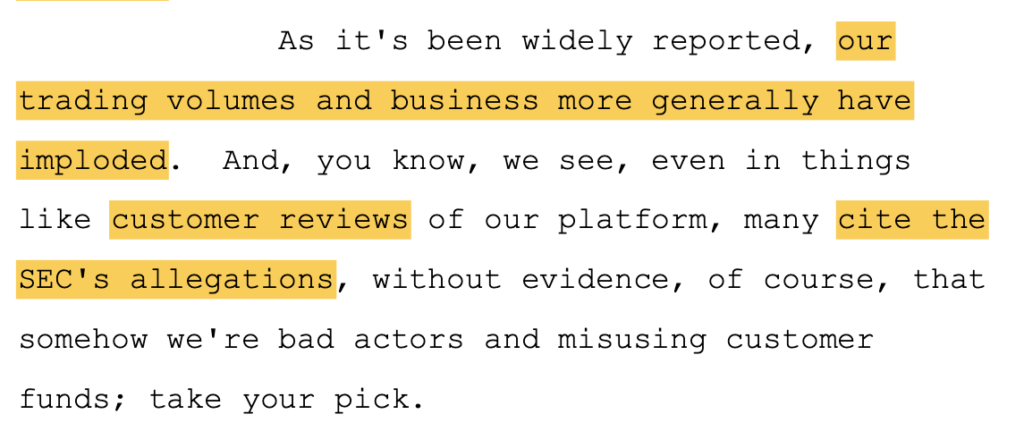Binance. US COO asserts that banks withdrew support from the exchange due to the SEC’s lawsuit last year, “effectively choking the business.”

According to a firm executive, Binance US suffered a “near-fatal blow” in June when the United States Securities and Exchange Commission filed a lawsuit, which forced the company to lay off more than 200 employees as revenues “implanted.”
Binance states, “To banks, we’re radioactive,” U.S. chief operating officer Christopher Blodgett stated as much in a December deposition attached to a court filing dated March 5 pertained to the SEC’s case against the U.S. subsidiary of cryptocurrency exchange Binance.
“One cannot fault them.” As soon as word got around that they were collaborating with Binance, “The SEC will likely issue a severe subpoena against the United States,” he warned.
The SEC I charged Binance, Binance.US, and founder Changpeng “C.Z.” Zhao with, among other allegations, selling unregistered securities in June of last year.
According to Blodgett, customers have been unable to transact in U.S. dollars because the exchange’s banking partners withdrew support, and it is unable to find replacements; this has “effectively suffocated the business.”
Blodgett stated that following the SEC’s action, Binance.US saw approximately “$1 billion of assets flee the platform” and later had to “terminate in excess of 200 people” — over two-thirds of the company — after its revenue “imploded on the order of 75 percent-plus,”

Trust in institutions was also undermined. Blodgett stated that the exchange had fewer than five market makers, down from over twenty before the lawsuit.
“At the highest level, it’s dealt a near-mortal blow.”
Binance, Binance.US, and Zhao were cited by the SEC with selling unregistered securities, engaging in wash trading to inflate the exchange’s volumes, and allegedly commingling user funds in an account at the Zhao-affiliated Merit Peak.
The SEC filed a temporary restraining order (TRO) to halt Binance the day following the lawsuit. A magistrate dismissed concerns that the U.S. would transfer customer funds overseas and seize its assets.
The Binance platform. A $4.3 billion settlement was reached in November between the U.S. and Zhao and the Department of Justice, Treasury, and the Commodity Futures Trading Commission after the two parties admitted to violating money laundering and terrorism financing laws.
Nonetheless, the SEC maintains its allegations and continues to gather evidence to support its case against the exchange. Zhao pleaded guilty to a money laundering charge before an April 3 sentencing hearing. The consequence is a maximum of eighteen months in incarceration.
